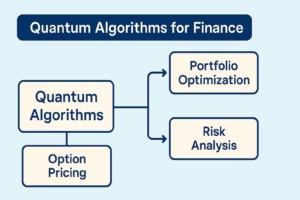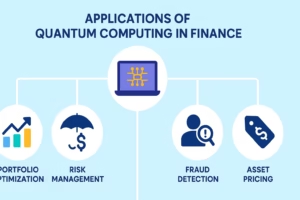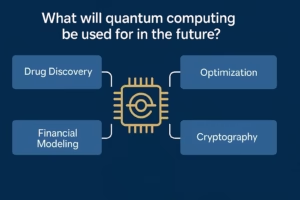Financial Modeling Using Quantum Computing: The Future of Finance
Quantum computing is rapidly revolutionizing various industries, and financial modeling is no exception. Financial modeling using quantum computing offers groundbreaking speed and accuracy for solving complex problems such as risk assessment, asset pricing, and portfolio optimization. As the technology matures, finance professionals are eyeing quantum solutions to gain a competitive edge.
In this article, we will explore how quantum computing reshapes financial modeling, its practical applications, quantum algorithms suited for finance, the current industry landscape, and future predictions. Let’s dive deep into the quantum-powered world of finance.
Traditional computers struggle with processing massive financial datasets and complex simulations, often taking hours or days to provide results. Quantum computers, with their ability to operate using qubits and parallelism, offer an exponential leap in computational capabilities. This power can be harnessed to execute tasks like Monte Carlo simulations, scenario analysis, and portfolio optimization more efficiently than classical systems.
Quantum Computing in Financial Modeling
Quantum computing enables new possibilities in financial modeling by tackling high-dimensional problems, nonlinear interactions, and large datasets. At its core, quantum computing leverages principles like superposition and entanglement to process information in fundamentally new ways.
One of the most promising areas is Monte Carlo simulations. Financial institutions often use these simulations to assess risks and predict market behaviors. Quantum Monte Carlo methods drastically reduce simulation time, enabling real-time analysis and faster decision-making. Similarly, quantum-based optimizers like the Quantum Approximate Optimization Algorithm (QAOA) are particularly useful for asset allocation and minimizing financial risk.
Quantum Algorithms for Finance

Quantum algorithms are the heart of quantum computing’s potential in finance. Several quantum algorithms are being explored for their suitability in solving financial problems.
1. Quantum Monte Carlo Methods
These are used to estimate future price paths for derivatives and assets, simulate interest rates, and perform risk evaluations. Unlike classical approaches, quantum Monte Carlo algorithms offer quadratic speedups.
2. HHL Algorithm (Harrow-Hassidim-Lloyd)
This algorithm solves systems of linear equations, which is useful for pricing and modeling portfolios. It offers exponential speedup over classical algorithms under certain conditions.
3. Quantum Optimization Algorithms
Quantum algorithms such as QAOA and Variational Quantum Eigensolver (VQE) help in portfolio optimization, arbitrage strategy modeling, and efficient frontier calculation.
Applications of Quantum Computing in Finance

The real-world applications of quantum computing in finance are growing rapidly. Here are the top areas where it’s making an impact:
1. Portfolio Optimization
Quantum computing helps identify the best combination of assets by considering constraints like risk, return, and market volatility. It dramatically reduces the computational load of the Markowitz efficient frontier model.
2. Risk Modeling and Stress Testing
Financial institutions use quantum simulations to test market shocks and evaluate potential losses, improving their readiness and compliance with regulations like Basel III.
3. Fraud Detection and Anomaly Recognition
Quantum machine learning algorithms can detect patterns in financial data that are too complex for classical systems, helping to identify fraudulent transactions more accurately and in real time.
Benefits and Limitations
Quantum computing offers several advantages for financial modeling, but there are also challenges to overcome.
1. Speed and Efficiency
Quantum computing can process enormous data sets at high speed, making real-time modeling possible.
2. Complexity Handling
It can handle problems with complex interdependencies and variables that classical models struggle to simulate.
3. Limitations
Quantum computing is still in its early stages. Noise, decoherence, and the need for error correction make it less accessible for everyday use. However, hybrid quantum-classical models are bridging this gap.
Industry Adoption and Quantum Startups
Several financial institutions and startups are leading the charge in integrating quantum technology into finance.
1. Banks and Financial Institutions
JPMorgan Chase, Goldman Sachs, and Barclays are actively investing in quantum research to improve risk assessment and trading algorithms.[YOUTUBE]
2. Fintech and Quantum Startups
Companies like Zapata Computing, QC Ware, and D-Wave offer quantum solutions tailored for finance. They are building platforms for financial analytics and quantum-enhanced ML models.
3. Government and Academia
Public-private partnerships and academic research institutions are accelerating innovation by making quantum computing more accessible through cloud platforms and open-source libraries.
The Future of Quantum Finance
Looking ahead, quantum computing has the potential to become a core pillar of financial operations, from hedge fund modeling to real-time trading.
1. Quantum-as-a-Service (QaaS)
Cloud platforms offering QaaS will democratize access to quantum resources, enabling mid-sized firms and fintechs to compete with larger players.
2. Integration with AI and Big Data
Quantum computing will be integrated with AI and big data platforms, enhancing the ability to extract insights from massive financial datasets.
3. Regulatory and Ethical Considerations
As quantum gains traction, new regulations will be required to ensure fairness, security, and ethical use in financial ecosystems.
What will quantum computing be used for in the future?

Quantum computing is expected to revolutionize several industries in the future by solving problems that are currently intractable for classical computers. Here’s a breakdown of key areas where quantum computing will likely be used:
1. Drug Discovery and Healthcare
Quantum computers can simulate molecules and chemical reactions at the quantum level, enabling:
- Faster drug discovery by modeling complex biomolecules like proteins.
- Personalized medicine by analyzing vast genomic and molecular data efficiently.
- Better materials design for biocompatible substances or medical implants.
2. Cryptography and Cybersecurity
Quantum computing will both threaten and improve security:
- Breaking current encryption: Quantum algorithms like Shor’s can factor large numbers quickly, compromising RSA encryption.
- Post-quantum cryptography: New cryptographic methods are being developed to resist quantum attacks.
3. Financial Modeling
Quantum algorithms can improve:
- Risk analysis and portfolio optimization by handling massive, uncertain datasets.
- Option pricing and simulation of financial models that are computationally intensive.
4. Artificial Intelligence and Machine Learning
Quantum computing could drastically speed up:
- Training of machine learning models by optimizing large parameter spaces.
- Data clustering, classification, and regression, especially with quantum-enhanced algorithms.
5. Optimization Problems
Industries with complex optimization needs—such as:
- Logistics and supply chains (route optimization, resource allocation),
- Manufacturing (process optimization),
- Energy (smart grid design, energy distribution),
can benefit from quantum speedups using algorithms like the Quantum Approximate Optimization Algorithm (QAOA).
6. Material Science and Chemistry
Quantum simulations will enable:
- Discovery of new materials like superconductors or batteries.
- Modeling of catalysts for efficient chemical reactions and greener industrial processes.
7. Climate and Weather Modeling
Quantum computing could improve:
- Climate modeling by handling chaotic systems and simulating interactions at a granular level.
- Carbon capture simulations and renewable energy optimization.
8. National Security and Defense
Governments are investing in quantum tech for:
- Secure communication (quantum key distribution),
- Satellite cryptography, and systems.
- Advanced simulations of nuclear and defense systems.



